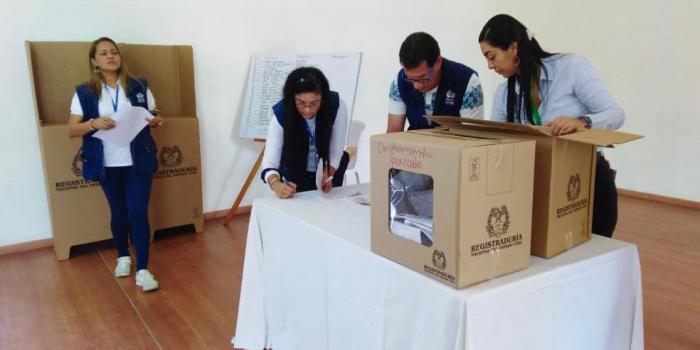
Paipa will be the scene of the election of National Victim Participation Board
The challenges for this table are the impact on issues related to supply, education and socioeconomic stabilization, as well as the articulation with the Truth, Justice, Reparation and Non-Repetition System.

A new election process for the National Victim Participation Board will gather 368 representatives from all over the country in Paipa (Boyacá), on November 5, 6 and 7, 2019.
The leaders, who started this process at the beginning of this year with the registration of 8,898 Victims Organizations (OVs) to which they belong and for which they were appointed, first presented themselves to a municipal election, then to a departmental one, and finally they achieved their quota to this election of National Board that represents the victims of the whole country.
This process resulted in the election and installation of 1,047 tables for the participation of victims at the municipal level, and 33 at the departmental level, including the Capital District, with the representation of all the victimizing events and differential approaches organized by the Protocol of Effective Participation of Victims with the understanding that the attention by the State must be differential based on gender, ethnicity, age or the affectation they suffered due to the conflict.
During the first day, a public policy training process will be carried out for victims in citizen participation, issues related to their representation at the tables and the Protocol for the Effective Participation of Victims. On the second day the election of the quotas to the National Participation Board (maximum 60 members) and the structure of the table structure will be carried out, a process in charge of the Ombudsman's Office.
On the third day the National Participation Board will be officially installed with the presence of local, regional and national authorities; and officials of the Victims Unit.
It is important to highlight that seven representatives of victims will arrive abroad to opt for two quotas to the National Participation Board residing in Ecuador, Venezuela, Spain, Canada, the United States, Sweden and Mexico.
“The work of this new National Participation Board will focus on the extension of the Victims Law period, reform of the Participation Protocol, and the work articulated with the Truth, Justice, Reparation and Non-Repetition System, as well as other issues related to the implementation of the Peace Agreement, such as Territorial Approach Development Programs (PDET), and offer, education and socioeconomic stabilization”, said Adriana Pinto, Deputy Director of Participation for the Victims Unit.
KEEP IN MIND
The boards of participation of the victims are the spaces for participation and representation of the population affected by conflict, which Law 1448 of 2011 brought, for dialogue with the State at all territorial levels (municipal, departmental, district and national), and whose purpose is the impact on the construction, execution and control of public policies for victims.
The tables of victims have their support in the Political Constitution, as development of the principles of representative and participatory democracy, and special protection of vulnerable populations; to the constitutional jurisprudence that develops the right to participation of population victim of armed conflict; and they are sustained in the postulates of Law 1448 of 2011, Regulatory Decree 4800 of the same year, and in Resolution 0388 of 2013 of the Victims Unit, which adopts the Protocol for the Effective Participation of Victims, as well as other rules and complementary jurisprudence.
The process of choosing the victims 'tables: Victims' Organizations (VO) register with any person in the country and nominate their representatives to all victimizing events and differential approaches, according to their nature. This process began on January 1 and lasted until March 31, 2019, with 8,898 Organizations registered throughout the country.
The victimizing facts are: Life and freedom, forced displacement, sexual violence, physical and psychological integrity; antipersonnel mines, forced disappearance). Differential approaches are: women, youth, LGBTI population, the elderly, people with disabilities, ethnic groups (Afro, indigenous and Roma or Roma).
After the registration the election process is carried out. The elected leaders of victims of each municipal board (elected from August 20 to September 10) send 11 of their representatives to the election of the departmental table (elected between September 20 to October 10), and from this, in turn, to the National Board, also 11 representatives.
The end result is that all members of the National Board, must necessarily be members of municipal and departmental tables, and all victimizing facts and differential approaches are represented, as well as all departments.
This year 1,047 municipal tables and 33 departmental tables were chosen, including that of the Capital District.
For this election of National Board there are seven representatives of victims abroad from Ecuador, Venezuela, Spain, Canada, United States, Sweden and Mexico, who will choose between them the two representation quotas. In this process, 340 Victim Organizations were registered abroad with 441 postulates.
In the first election process 2013-2015, 920 tables of victims were chosen (886 municipal tables, 1 District Board of Bogotá, 32 departmental and 1 National Board); For the 2015-2017 period (second period), 1,030 victim tables (14 local Bogotá tables, 982 municipal tables, 1 Bogotá District Board, 32 departmental tables and 1 National Table) were chosen, for the 2017-2019 period ( third period), 1,057 tables of victims were chosen (19 local tables of Bogotá, 1,004 municipal tables, 1 District Board of Bogotá, 32 departmental tables and 1 National Table).
(End/APG/LMY)






